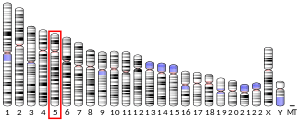Repulsive guidance molecule B
Repulsive guidance molecule B (RGMb), also known as DRAGON (DRG11-responsive axonal guidance and outgrowth of neurite), is a bone morphogenetic protein (BMP) co-receptor of the repulsive guidance molecule family.[5] In humans this protein is encoded by the RGMB gene.[6]
Function
RGMB is a glycosylphosphatidylinositol (GPI)-anchored member of the repulsive guidance molecule family (see also RGMA and RGMC) and contributes to the patterning of the developing nervous system.[7][8]
There is a potential association between RGMs and cancer bone metastasis, as RGMs coordinate bone morphogenetic protein (BMP) signaling. RGMB may act as a negative regulator in vitro in breast cancer and prostate cancer through BMP signalling.[9][10] Furthermore, aberrant expression of RGMs was indicated in breast cancer. The perturbed expression was associated with disease progression and poor prognosis.[11]
References
- 1 2 3 GRCh38: Ensembl release 89: ENSG00000174136 - Ensembl, May 2017
- 1 2 3 GRCm38: Ensembl release 89: ENSMUSG00000048027 - Ensembl, May 2017
- ↑ "Human PubMed Reference:".
- ↑ "Mouse PubMed Reference:".
- ↑ Corradini, Elena; Babitt, Jodie L.; Lin, Herbert Y. (October 2009). "The RGM/DRAGON family of BMP co-receptors". Cytokine & Growth Factor Reviews. 20 (5–6): 389–398. doi:10.1016/j.cytogfr.2009.10.008. PMC 3715994.
- ↑ "Entrez Gene: RGM domain family".
- ↑ Samad TA, Rebbapragada A, Bell E, Zhang Y, Sidis Y, Jeong SJ, Campagna JA, Perusini S, Fabrizio DA, Schneyer AL, Lin HY, Brivanlou AH, Attisano L, Woolf CJ (April 2005). "DRAGON, a bone morphogenetic protein co-receptor". J. Biol. Chem. 280 (14): 14122–9. doi:10.1074/jbc.M410034200. PMID 15671031.
- ↑ Severyn CJ, Shinde U, Rotwein P (September 2009). "Molecular biology, genetics and biochemistry of the repulsive guidance molecule family". Biochem. J. 422 (3): 393–403. doi:10.1042/BJ20090978. PMC 4242795. PMID 19698085.
- ↑ Li J, Ye L, Sanders AJ, Jiang WG (March 2012). "Repulsive guidance molecule B (RGMB) plays negative roles in breast cancer by coordinating BMP signaling". J Cell Biochem. 113 (7): 2523–31. doi:10.1002/jcb.24128. PMID 22415859.
- ↑ Li J, Ye L, Kynaston HG, Jiang WG (February 2012). "Repulsive guidance molecules, novel bone morphogenetic protein co-receptors, are key regulators of the growth and aggressiveness of prostate cancer cells". Int. J. Oncol. 40 (2): 544–50. doi:10.3892/ijo.2011.1251. PMID 22076499.
- ↑ Li J, Ye L, Mansel RE, Jiang WG (May 2011). "Potential prognostic value of repulsive guidance molecules in breast cancer". Anticancer Res. 31 (5): 1703–11. PMID 21617229.
Further reading
- Strausberg RL, Feingold EA, Grouse LH, et al. (2002). "Generation and initial analysis of more than 15,000 full-length human and mouse cDNA sequences". Proc. Natl. Acad. Sci. U.S.A. 99 (26): 16899–903. doi:10.1073/pnas.242603899. PMC 139241. PMID 12477932.
- Samad TA, Srinivasan A, Karchewski LA, et al. (2004). "DRAGON: a member of the repulsive guidance molecule-related family of neuronal- and muscle-expressed membrane proteins is regulated by DRG11 and has neuronal adhesive properties". J. Neurosci. 24 (8): 2027–36. doi:10.1523/JNEUROSCI.4115-03.2004. PMID 14985445.
- Gerhard DS, Wagner L, Feingold EA, et al. (2004). "The status, quality, and expansion of the NIH full-length cDNA project: the Mammalian Gene Collection (MGC)". Genome Res. 14 (10B): 2121–7. doi:10.1101/gr.2596504. PMC 528928. PMID 15489334.
- Ota T, Suzuki Y, Nishikawa T, et al. (2004). "Complete sequencing and characterization of 21,243 full-length human cDNAs". Nat. Genet. 36 (1): 40–5. doi:10.1038/ng1285. PMID 14702039.
This article incorporates text from the United States National Library of Medicine, which is in the public domain.



